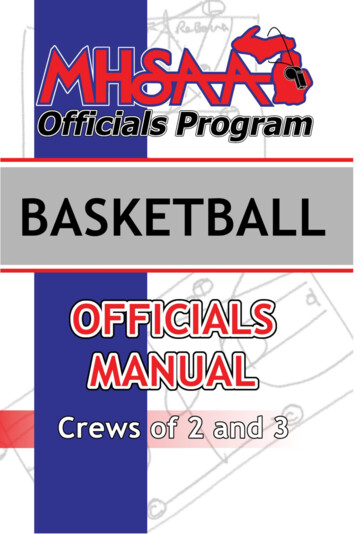
Transcription
Quality CoachingCoaching Tee Ball and Coach PitchMaking it Fun for You and the KidsBy Don EdlinOwnerQCBaseball.com
Chapters1. Introduction2. Should I Coach?3. What Personal Characteristics or Experience do I need to be a Successful Coach?4. Before the First Practice5. Parent Meeting6. Equipment7. What Should I Teach?8. First Practice9. Communication10. Expectations11. Discipline12. Practices13. Home Activities14. Game Time15. Parents16. Learning the Game17. Competition18. Having Fun as the Coach19. Things to Avoid20. Self-EvaluateAppendix A – Strategies for the Reluctant VolunteerAppendix B – Sample Parent LetterAppendix C – Practice Plan Template QCBaseball.com1
About the AuthorDon Edlin is the founder of the website Quality Coaching – Baseball (QCBaseball.com)which has been publishing baseball focused instruction and coaching information since2000. Don has over 20 years of coaching experience at the youth level for multiplesports and has coached baseball from tee ball through high school. As a believer inpositive coaching, this manual is an attempt to get coaches started in the rightdirection and learn from his experience. Please check out QCBaseball.com for morecoaching and instruction information. First published in 2004 this manual has beenupdated and republished in 2014.Few years ago with mytwo boys.My kids have grown up since thismanual was first published. My olderson (left) has graduated high schooland my younger son (right) iscurrently a junior. They’ve alwaysenjoyed being involved in multiplesports. Quality Coaching - 2014 QCBaseball.com2
Chapter 1IntroductionAsk a good coach why he coaches and you’ll get a number of worthy reasons. If youwere able to nail down the most important reason, I believe the majority would tellyou that they coach because they enjoy it. You can say you’re giving back to thecommunity or you want to spend some quality time with your child; but in the end, ifyou don’t enjoy the experience, you won’t be doing your best and your coachingcareer will be short.This manual attempts to present a quick overview of coaching this level, with theoverriding goal that the experience not only be positive for your players, but foryourself as well. I take my role as a youth coach very seriously and I hope you doalso. I try to continually learn more and improve as a coach. I wouldn’t have thatdesire if I didn’t enjoy being a coach. If you take just one thing from this manual, Ihope it’s an understanding that you need to try your best to make the experience agreat one for you. If you can do that then I believe the kids will also enjoy theexperience.As a coach you’ll have a direct influence on your players. It isn’t a question ofwhether or not you’re a role model; the question is “what type of role model will yoube?” Youth leagues need as many positive role models as they can get. We’ve allseen coaches who we wouldn’t consider to be positive role models. Many of them arevery good people who for one reason or another get caught up in the moment or areoverwhelmed by the responsibilities and let that impact them in a negative way. Ibelieve anyone with good intensions and the ability to self regulate in pressuresituations can become a good coach and role model. The recipe includes a good dealof dedication and hard work, but the end result can be both rewarding and fun. QCBaseball.com3
The next chapter in this manual will talk about making the decision to coach or not. Irealize that many leagues are desperate for coaches, but the fact is many people can’teffectively coach, especially at this age level. If the decision has already been made,but you’re not excited about it, make sure you read Appendix A which discussesstrategies you can use to offset problem areas. QCBaseball.com4
Chapter 2Should I Coach?Coaching is a huge responsibility and the decision to coach should not be takenlightly. In this chapter I’ll present a number of topics that should be taken intoconsideration when making the decision. Motivation Personality Coaching Your Own Child Other ResponsibilitiesMotivationThe first item for you to consider is your motivation for coaching. Why do you want tocoach? What are the first few reasons that come to mind? (Pause here why you thinkabout it). Those reasons may be something like: “They needed someone.” “Nobody else would do it.” “The other parents don’t know anything about baseball” “I was a good player growing up, so I’ll make a good coach” “My child wants me to” “It will be a good opportunity to spend some quality time with my child”If those are some of your first thoughts then I think you may be getting into morethan you bargained for. Many people who volunteer don’t realize all the time, effort,and organization that is required when coaching. They also may not be prepared forthe high expectations that the other parents will have of the coach. For the lastminute volunteer this last point can come as quite a shock. I once received an emailfrom a first time coach pleading for help. In his email to me he stated: QCBaseball.com5
“Nobody would step up and volunteer, so finally I said I would do it. Theparents were thrilled when I said I would do it and now those same parentsare unhappy with the way I’m handling the team. I told them I hadn’tcoached before and now it seems like everyone has an opinion about whatI’m doing wrong.”This is not an uncommon comment from new coaches who are taking on theresponsibility of coaching for the first time. They feel, and rightly so, that they aremaking a big sacrifice to help out the kids and it isn’t fair that the other parents whowouldn’t volunteer are now complaining. Unfair or not, the criticism will still occurand most often will lead to negative feelings about the coaching experience.I believe to truly enjoy coaching at this level, or any level for that matter, you need toexpand on your reasons for coaching to include items that provide a personal sense ofhappiness and reward. Put aside all of the community service reasons and thinkabout aspects of coaching that can give you a feeling of satisfaction and joy. If youcan come up with reasons that enhance your happiness and personal feelings ofsatisfaction, you will find greater motivation to be the best coach you can. To giveyou an idea, here are a few of my personal reasons (things that benefit me) forcoaching. I enjoy being part of a team.I think one of the reasons I’m not a good golfer is I don’t really enjoy going tothe driving range and hitting a bucket of balls. It may be necessary to improve,but hanging out at a driving range is like hanging out at a library. It’s too quiet.I enjoy golf because I get to hang around with my friends and family. It’s thatinteraction with other people that’s half the fun. I feel the same way when I’mnot coaching my son and I sit and watch the game. I’m sitting in the standsand while I enjoy watching the game, it’s not the same as being in the dugoutwith the kids and being part of the team. I always tell my players that being QCBaseball.com6
part of a team is something special and it’s really true. The interaction with theplayers that takes place on the field is something that can’t be duplicated whenyou sit in the stands. I like to teach.Showing your team or an individual player how to perform a skill can be a lot offun and very rewarding. With this age group the kids try really hard to doexactly what you say. It’s a thrill to see the happiness that occurs when aplayer has learned something new and is able to perform that skill. I enjoy acting like a kid.Tee ball and coach pitch give me the opportunity to get right in there and play.The kids don’t understand the concept of working or practicing hard, nor shouldthey be expected to. What they do understand is the concept of playing hardand having fun. I try to take advantage of that and play hard right along withthem. What a great excuse to act like a kid again. The other benefit, kids lovewhen you play along with them. They have a blast and while playing hardthey’re learning. Coaching is a challenge.One of the intriguing aspects of baseball is that while you may be a good player,there are always ways to improve. This is of course true with most everythingin life, and coaching is the same way. Each year I write down notes of thingsthat didn’t work the way I wanted them to. Ideas of how I can improve. I readbooks about coaching and books by great coaches. I find the challenge ofbecoming a better coach each year exciting. For my personal satisfaction I wantto be able to look back on each season and know that I gave it my best effort.Do I make mistakes? Of course. Are there things I wish I would have donedifferently? Every year the answer is the same, yes! In the end, I love thechallenge of trying to continually improve and get better. For both players and QCBaseball.com7
coaches that concept is really one of the main lessons that sports can teach us.The added bonus is it can be used in every part of your life. I love spending time with the kids.I saved this for last, but it’s really first on my list. Being out on the field withthe kids is a great way to spend time. I coached youth teams before I had kidsand I’m sure I will still be coaching them when my kids are out of organizedathletics.It’s important to realize that to be good at coaching you have to be doing it forreasons other than “they needed someone”. Almost anyone can become a very goodyouth coach, but it’s like anything else you’re good at, it takes a desire to becomegood at it. Many youth organizations are requiring that all their coaches take sometype of training before coaching a youth team. I think this is a great step forward inmaking sure that youth coaches are prepared prior to getting on the field. Yourleague may or may not require that training, but either way there are always things tolearn and ways to improve. I believe the best coaches are self motivated. They wantto improve and get better because they enjoy what they are doing. My feeling is thatdesire will come naturally if you can turn coaching into an activity that you can enjoyand feel good about. If it’s personally rewarding for you to coach, you’ll want to dothe best you can to maximize that reward.Age of KidsIn the list above I stated a personal reason for coaching as “I love spending time withthe kids”. That item was listed last because it leads right into this section. Tee balland coach pitch normally has kids ranging from 4 to 7 years old. While I think it’s alot of fun coaching and spending time with kids this age, you may not feel the same.It takes an amazing amount of perseverance and patience to coach this age group.Listening and following directions for any length of time (over 30 seconds) can be achallenge for the kids. You’ll be teaching many of the same skills over and over again QCBaseball.com8
with many players often showing little improvement from practice to practice. Anydreams of turning your team into a well oiled machine should be abandoned beforeyou start your first practice. I don’t mean to sound like a defeatist, but you neverknow what kind of talent you’re going to get. Try as you may, you might haveplayers at the end of the season that can’t throw or hit at what you might considerand acceptable level. This can be difficult for a coach with high performanceexpectations.In addition to enjoying this age group of kids, you also have to ask yourself if you canhandle coaching at this beginning level.Can You Coach Your Own Child?This is a big question that can change from year to year. I’ve only had one badseason with my son where I probably should not have coached him. It was a 9 yearold basketball team and although I had coached him in the past with no problems,this season he could not separate coach from Dad and he didn’t want to listen to Dadthis season. Now basketball isn’t his favorite sport and he didn’t want to play the nextseason, so that may have had a lot to do with our problems. He wanted to playbecause his friends were playing not because he really enjoyed basketball. Whateverthe reason, I’m sure there are others; it was a difficult season that was tough for bothof us. I didn’t see it coming and you might may not either. On the other hand I’veseen other coaches who struggle with the same issue on a yearly basis and it seemscrystal clear to me that it’s simply not working. In the end, you want coaching toenhance your relationship with your child, not take away from it.We’ve talked about your motivation for coaching, but what is your child’s motivationfor playing? With my son, the motivation for that one season was to spend time withhis friends. With that being the goal, he was more interested in a playground type ofatmosphere where messing around and having a good time with his buddies were theprimary objectives. Now he was a little older than the kids you’re going to be QCBaseball.com9
coaching, but I’ve seen the same problems at the tee ball and coach pitch levels. Thereasons for a child not behaving at practice may be many, but if it’s your child (andyou have a difficult time applying consistent expectations and discipline), it will be along season for you and the other kids on the team.In addition to the motivating factors for your child wanting to play, think about yourrelationship with your child and especially how he or she interacts with you whenhis/her friends are around. Does your child stop listening to you in those situations?Does your child start talking back or behaving in a wild or inappropriate manner? Doyou let your child get away with inappropriate behavior because you don’t want toembarrass him/her in front of friends? In general, parents that have a difficult timebeing consistent with disciplining their children will run into more problems trying tocoach them.Now, all of the above can be true and you can still have a very successful seasoncoaching your child. How? You ask. The key is having an assistant coach that has thesame or similar coaching philosophy as you, especially when it comes to teamdiscipline. This way if there is an issue with your child, you will have an assistantcoach who can jump in and take care of any situation that may come up. You mayfind that the assistant coach will need you to do the same for his/her child. A goodassistant coach is invaluable for many different reasons, but if he/she can help easeany friction between you and your child then that coach can be the difference betweenan enjoyable season and one that you would like to forget.Now you may find that a perfect assistant coach doesn’t approach you at the firstpractice or team meeting and volunteer. If you don’t know the parents well or whomight make a good assistant coach, this is for the best. At this level you want asmany parents helping out at practice as you can get. Ask for help from all the parentsrather than asking for someone to volunteer as an assistant. Once you see themwork with the kids at a practice or two, you’ll have a much better idea of the parent(s) QCBaseball.com10
you feel would do the best job. You can then approach him/her individually and ask ifhe/she will take on a more official role of assistant coach.In the start of this section I stated I had one season where I shouldn’t have coachedmy son. Now that I’ve gone over the importance of selecting an assistant coach, it’simportant to note that the assistant coach should have a similar style in order for youto work well together. That season, I had a parent volunteer to be an assistant duringthe first meeting. I said great, just happy to have someone to help me. The problemwas that his coaching style didn’t match mine at all. I really like to have structuredand well organized practices no matter the age of the kids. I also have expectationsthat the kids will listen and not talk or mess around while I’m talking. This coachdidn’t enforce those principals during practices or games. The kids picked up on thisand when he was in charge of a drill or other activity it quickly turned into aplayground activity where the kids pretty much did what they wanted and got awaywith it. As I look back on it I don’t think I made a mistake in accepting a willingvolunteer, but where I made a big mistake was in thinking that it would get better asthe season went along. I talked to him about wanting the kids to listen and not tryingto talk over them. I told him how I liked practices to be run and could he help makesure that players followed team rules when he was in charge of a drill. He agreedwith everything I said, but nothing really changed from week to week. What I believeI should have done was asked another parent to start helping out and explain whatthe expectations were as far as discipline and behavior. Then I could have changedthe role of the coach who was having a difficult time. I could have had him do moreone on one teaching for example.Coaching your own child can be a great experience. I’ve been doing it for years andthe majority of the time it’s been great. QCBaseball.com11
Manage (Head Coach) or AssistantIf you’re reading this there is a very good chance that the decision has already beenmade. It’s still worth discussing if only for future reference. Managing a teamcertainly means more work and more time involvement, unless you’re excellent atdelegating tasks. For the majority of coaches it requires a greater commitment oftime and energy. Now you may be thinking “why take on the headache of managinga team when I can be an assistant and still enjoy coaching without the addedadministrative effort?” It’s a valid question and for me it really comes down to acouple of things.First, I like to organize practices and make decisions about how the team is going tobe run. I believe my background and commitment to coaching provide a basis for awell organized and enjoyable learning environment for the kids. I really feel a senseof responsibility. If I feel like I’m more qualified than the other parents than I shouldfollow through and coach.Second, I enjoy the experience of being a head coach more than I have being anassistant. It’s not that I couldn’t be happy being an assistant. I’ve been an assistantcoach many times in the past and I’m sure I’ll be in the future. I would nevervolunteer to be an assistant without knowing who the head coach is. To be anassistant and to be happy doing it, I believe you have to be in agreement with thecoaching philosophy and methods used by the head coach. If not, it will be a struggleto contribute and help when you don’t agree with what the coach is doing or howhe/she is doing it. I happen to believe that I can do a better job than a parent whodoesn’t want to do it, but volunteers because nobody else would. In that case, if Isimply didn’t have time to coach, then it would be difficult for me to be an assistantuntil I found out more about the head coach. I’ve known parents who will assistantevery year and they always have seasons that don’t go well because of differences inphilosophy between them and the head coach. I wonder what keeps them from QCBaseball.com12
taking the reins and having a good season each and every year by being the headcoach.So, when making the decision to manage or assist, be honest about the situation.What’s your experience, knowledge, and personality? With that information try todetermine if you’re the best candidate for the head coaching position. If you thinkyou are, then go for it and do the best you can.If not, then you have to ask yourself whether you like the head coach and are inagreement with his/her coaching philosophy. If you are, then being an assistantcoach may be a great opportunity to learn from someone with more experience. Theknowledge you gain will help you get ready to take on the head coachingresponsibility in future seasons.Not Sure If I Have Time to CoachFor most people this really comes down to your work schedule. Often games and/orpractices are scheduled in the late afternoon or early evening and can be difficult forpeople that have to work to a certain time or commute a long distance to make it. Ifthis is you then I would check into a few things prior to making a decision. First,many companies allow a certain amount of time to be used for non-profit volunteerwork. You may not think of coaching in those terms, but many youth leagues are setup as non-profit organizations. So check with your work and see if this is the case.You may find that your company will allow you to can take some time off or rearrangeyour schedule during the season to help you make coaching an option.Second, most leagues will allow you to schedule later practices if you have a workissue. Check with the scheduler and tell him/her that you need a later practice timeor you won’t be able to coach.Third, a supportive spouse and/or assistant coach can help get practices and/orgames going if you’re going to be a little late. QCBaseball.com13
For some the “lack of time” excuse is just that, an excuse. Most coaches and leagueadministrators are short on time and many of them could use that same excuse ifthey wanted to.No Really I don’t have time to coach!If you really have a schedule that won’t allow you to be on time for practices or you’llhave to miss a number of practices and/or games, then this schedule conflict couldpose a real problem on your ability to coach successfully. If parents and players arecontinually waiting for you to show up, this will usually result in negative feelingsabout you by the other parents.If you fall into this category, then you have a decision to make.1. If there’s another willing and able coach, then you may want to step aside andlet the other person coach.2. If there’s no other willing and/or able coach, then you will need to make sureyou have the necessary help to make this situation work. Be honest withyourself about your ability to get to practices and game on time. If you can’t,then have someone lined up to bring the equipment and get things started untilyou can get there. Being 10 minutes late for each practice, but being preparedand planning for it, is different from being late to half the practices and nothaving a plan for it. You simply can’t perform as a coach if you’re only therepart of the time and can’t delegate properly to make up for your absence.To give you an example, a postal worker once signed up to coach my son’sbasketball team. He had played for a number of years and loved the game.Unfortunately the games were on Saturday and he worked on Saturday. Therewas no way for him to get out of work and so he missed most of the games.His schedule just didn’t work and it would have been better if he would have letsomeone else coach the team and he could have just helped at practice. QCBaseball.com14
Your answer is?1. Can’t do it. Even though you have decided to step aside and let someone elsecoach, still try to be involved as much as possible. This won’t be your lastopportunity to coach a team, so try to help out and learn as much as you can.Watching and working with other coaches and parents can help shape yourcoaching philosophy and prepare you for coming seasons.2. You don’t have time but you’re still coaching. A tough thing to do, butcertainly not impossible. Here are some ideas to help you not only survive, butenjoy the experience:o Communication Parents need to know what your schedule is and how that’s going toaffect the team. When you provide a practice schedule, let themknow what time practice will start and what time you will be there.Let them know who will be in charge while you’re gone. Players don’t need to know your exact schedule, but they will becurious when you’re not there. Let them know what to expect whenyou’re not there. “I will be about 10 minutes late to practice eachnight. Coach Sally will be in charge and she will help you getwarmed up ”o DelegateThere is nothing worse than parents standing around with their kidswaiting for the coach to show up. If you can’t make it on time, don’t keepthe equipment with you. Have a parent who can be in charge of takingthe equipment to and from practice. Have an assistant coach who will bein charge when you’re not at practice. If you need to pass out informationat practice, have a parent who can organize, print, and distribute team QCBaseball.com15
information. That way you can just email him/her changes and he/shecan make sure everyone is informed.o RoutineAssistant coaches will often not know what to do with the kids whenyou’re not there. If you’re going to be late to practice, come up with aroutine to start your practices with. Team jog around the field. Team stretch and warm-up. Play catch with a partner Some fun activityBy having a routine for the start of every practice, the kids will know whatto expect whether you’re there or not. In addition, the assistant coachwill also feel confident stepping in until you get there. Have a list of otheractivities that the coach can chose from in case traffic prevents you frommaking it to practice at your normal time. QCBaseball.com16
Chapter 3What Personal Characteristics or Experience do I need to be a SuccessfulCoach?The first excuse a potential coach may give is that they don’t know much aboutbaseball and/or have little playing experience. While at higher levels of baseball thismight be an issue, it’s not an issue in tee ball or coach pitch. Certainly you’ll want tolearn about the game and how it’s played as you go along, but it’s really a secondaryissue when deciding if you want to or can coach at this level. To take it a step farther,coaching will provide you with a great opportunity to learn more about the game. Ifyou’re the type of person who’s not afraid to learn something new, then “lack ofknowledge” can provide some of the same excitement for learning that your playerswill experience. The “how to” as far as baseball skills is well documented and coverednot only within this guide, but in many other places as well. Now that we have thatout of the way, let’s look at some more important personal characteristics andexperience that will help you as a coach.NurturingI love the line “There’s no crying in baseball” by Tom Hanks in the movie “A League ofTheir Own” after one of the women on the team is seen crying in the dugout. In teeball and coach pitch, there’s plenty of crying to go with about every other emotion youcan think of. I’ve often wished I had a degree in child psychology so I would knowhow to deal with all the emotional issues that come into play during a baseballseason. I’ll try to sum it up in one word by saying that you have to be nurturing. Thereason I use this word is it encompasses more than just being supportive or positive.A pat on the back and “you’ll get ‘em next time” may be a positive statement, butoften it’s not enough to help the player improve and be prepared for the nextopportunity. Confidence is fleeting at this age and one bad play can ruin an otherwisegood practice or game. You need to remember that this may be the first time aplayer has played on a team. Not being able to hit the ball or catch the ball with QCBaseball.com17
everyone watching can be tough on a young player. Many kids will look to thenegative side of things and they need a coach to help them believe that they can doit. Continual positive reinforcement is necessary to keep some kids on track and isharmful to no one.Decision MakingKids in general are great at badgering. If they learn that after being told “no” ninetimes that you’ll say “yes” on the tenth time, then get prepared to be badgered.When you make a decision about batting order, positions, or who is going whereduring practice, stick with it. I let the kids know that I come up with the batting orderand positions in advance and it will do no good for them to ask. I let them know thatthe same is true during practice and I tell them my rule, which is: “If you ask to playa certain position, or hit in a specific spot in the order, or go to a specific stationduring practice, I will make sure to put you somewhere else even if I was planning onputting you where you asked.” I tell them the same holds true for asking to go first.By asking they end up at the end of the line. Now that may sound a little strict toyou, but it really goes back to making baseball a fun experience for both you and thekids. If you have every kid asking you to go here or there every time you start a drillor and inning is starting, you’ll never get anything done. Kids respond well toorganization and structure. Believe me it’s a key to coaching happiness.LeadershipBeing prepared and organized; executing your practice plans; having fun with theteam; enjoying the games: These items will all lead to you gaining confidence as acoach. I believe it’s important to show that confidence right from the start whetheryou have it or not. There are all types of leaders, so if you’re not a “rah rah” type ofperson, that doesn’t mean you’re not a good leader, it just means you wouldn’t makea good cheerleader. As a coach you’re in a leadership role, so act like a leader fromday one. QCBaseball.com18
The kids will follow your lead and try their best to make you happy and meet theexpectations you have set. What happens if a player misses practice? The playermisses out, but the team still functions. What if the coach misses practice? Thewhole team misses out.As the coach you’re the driving force for most things thathappen during a season. Decide right from the beginning that you’re going to takecharge and lead. Are you going to make mistakes? Of course, everyone does.Nobody ever said the coach can’t make mistakes. Handling those mistakes in aproductive, positive way provides a great example to your players.Turn your mistakes into a positive teaching tool.With older kids, I’ll often summarize our previous game, going over some positiveaspects of the game we played and a few items that I feel we need to improve on. Itry to focus on the t
in life, and coaching is the same way. Each year I write down notes of things that didn’t work the way I wanted them to. Ideas of how I can improve. I read books about coaching and books by great coaches. I find the challenge of becoming a better coach










